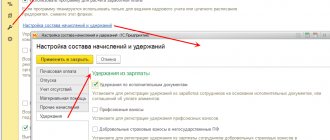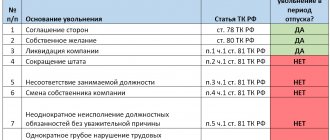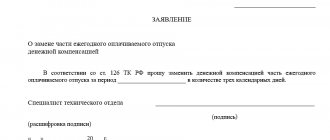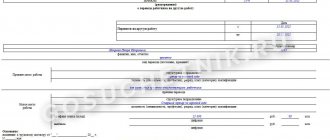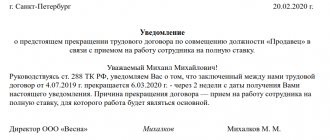Annual leave can be postponed to another date and even to the next year if there is a reason for it, as well as by agreement of the parties.
The initiator of the transfer can be either the employee or the employer. In this case, the reason may be an employee’s sick leave on vacation, performance of government duties, production necessity or family circumstances. The changes come into force after the transfer order is issued.
Planning the use of annual leave
The Labor Code of the Russian Federation (Article 123) requires the employer to plan vacations for its employees for each coming year, reflecting the time of their provision in the vacation schedule, approved no later than 2 weeks before the start of the next year. In accordance with this schedule, employees must go on vacation, and the employer must not only let them go there, but even before it starts no later than:
- give 2 weeks notice of your planned vacation against receipt;
- 3 calendar days to pay vacation pay (Article 136 of the Labor Code of the Russian Federation, information from the Ministry of Labor of Russia dated June 16, 2014).
Does this mean that no deviations from the vacation schedule are possible and that the transfer of annual leave at the initiative of the employee is unacceptable? No, it doesn't mean that. Despite the fact that the schedule is a binding document, deviations from it are not only possible, but in some cases they turn out to be necessary.
All reasons for postponing vacation can be divided into 3 groups:
- The employer is obliged to extend or postpone leave by agreeing on the specific type of action and timing with the employee.
- The employee makes a request for a transfer. The employer here may have both an obligation to agree with this and the right to give or not give his consent to the transfer of leave at the request of the employee.
- The initiative for the transfer comes from the employer, and in order for it to take place, the employee must give his consent.
The justification for the latter situation is production necessity. Moreover, it is even possible to postpone the time of the next vacation to the next year, if the employee is not one of those for whom failure to provide vacation annually is prohibited (Article 124 of the Labor Code of the Russian Federation). These are the faces:
- under the age of 18;
- working in harmful or dangerous conditions.
It should be borne in mind that additional vacations available to “harmful workers” and some other persons, in terms of transfer, will be subject to the same rules as regular vacations.
ConsultantPlus experts told us what documents to use to formalize the transfer of vacation for any reason. Get free trial access to the system and move on to the Ready-made solution.
Determining the duration of vacation
Every year, an employee has the right to count on 28 calendar days of vacation (Article 115 of the Labor Code of the Russian Federation). Non-working holidays are not included in the number of calendar days of vacation (Article 120 of the Labor Code of the Russian Federation).
Additional vacation days are provided to certain categories of employees (Article 116 of the Labor Code of the Russian Federation):
- employed in jobs with harmful or dangerous working conditions;
- having a special nature of work or irregular working hours;
- working in the Far North and similar areas, etc.
Upon written application by the employee, part of the vacation exceeding 28 days is replaced by monetary compensation (Article 126 of the Labor Code of the Russian Federation).
Useful information from Consultant+
For most employees, the duration of vacation is 28 calendar days, but there are exceptions. Thus, some workers have extended vacation, for example, for minors - 31 calendar days. In rare cases, the duration of annual main leave is set in working days. For example, an employee with a fixed-term employment contract of up to two months is entitled to leave at the rate of two working days per month of work - when recalculated into calendar days, the period of such leave may be longer when there are weekends in its period, but such leave is less than the usual 28 calendar days ( Article 115, Part 1, Article 120, Article 267, Article 291 of the Labor Code of the Russian Federation). For details, see here.
Vacation, by agreement between the employee and the employer, is divided into parts, one of which must be at least 14 days (Article 125 of the Labor Code of the Russian Federation).
Grounds for the obligation to extend or reschedule vacation
The employer is obligated to extend or postpone vacation in cases where the vacation period coincides:
- with sick leave (but only the employee himself, and not his family members);
- the period of performance by the employee of state duties requiring release from work;
- other situation provided for by law (including local regulations).
By agreement with the employee, the vacation is either extended by the number of days unused by him for the above reason (the reason must be documented, but no other papers will be required), or transferred to other days (in this case, an application from the employee is required indicating the specific period).
Another obligatory basis for the employer for postponing vacation at the initiative of the employee is the violation of one of the deadlines that is important for the vacation (warning the employee about its start or payment of vacation pay). In such a situation, an employee is given the right to demand the transfer of rest time to another period (Article 124 of the Labor Code of the Russian Federation).
Consent to transfer
Often, employers threaten their employees that they will not give them time to rest by issuing a rescheduling order. How legal is it to delay your vacation?
In fact, such threats from the point of view of labor law are empty words. The fact is that the Labor Code provides for the following rules:
- The agreed schedule is mandatory for both parties - both the worker and the management of the enterprise.
- If an employee refuses, no one has the right to reschedule vacation without the employee’s consent.
If the management does not want to let the person go, various measures can be applied, from a fine to the reinstatement of the illegally dismissed person, if the departure was counted as absenteeism.
Reasons for shifting leave at the employee’s initiative
Other reasons for postponing vacation at the employee’s initiative can be very different, and here the employer will be the coordinating party. However, there are situations where the employer does not have the right to refuse. At a time convenient for him, leave will be granted to the employee:
- who has adopted a child under 3 months of age (Article 122 of the Labor Code of the Russian Federation);
- the husband of a woman on maternity leave (Article 123 of the Labor Code of the Russian Federation);
- a woman who wants to add her next leave to maternity leave or child care leave (Article 260 of the Labor Code of the Russian Federation);
- parent (including adopted), guardian or trustee of a disabled child under the age of 18 (Article 262.1 of the Labor Code of the Russian Federation);
- under the age of 18 (Article 267 of the Labor Code of the Russian Federation);
- a part-time worker taking leave at the place of his main job (Article 286 of the Labor Code of the Russian Federation);
- the victim of the accident at the Chernobyl nuclear power plant or those who participated in the liquidation of its consequences (clause 5 of article 14, article 15 of the law “On Social Protection...” dated May 15, 1991 No. 1244-1);
- who received a dose of radiation during nuclear testing at the test site in Semipalatinsk (clause 15 of Article 2 of the Law “On Social Guarantees...” dated January 10, 2002 No. 2-FZ);
- marked with the “Honorary Donor” sign (subclause 1, clause 1, article 23 of the law “On donation...” dated July 20, 2012 No. 125-FZ);
- a disabled person, a war participant, a combat veteran or on duty in the territory of their jurisdiction, who underwent military training or worked for the defense of the country during the Second World War, who lived in besieged Leningrad (subparagraph 17, paragraph 1, article 14, subparagraph 15, paragraph 1 article 15, subparagraph 13 paragraph 1, subparagraph 4 paragraph 2, subparagraph 3 paragraph 3 article 16, paragraph 9 article 17, paragraph 9 article 18, paragraph 10 article 19 of the law “On Veterans” dated January 12, 1995 No. 5-FZ);
- the spouse of a military serviceman receiving leave at his place of duty (Clause 11, Article 11 of the Law “On the Status of Military Personnel” dated May 27, 1998 No. 76-FZ);
- a police officer who did not have the opportunity to exercise his right to leave in accordance with the approved schedule (clause 3 of article 57, clause 2 of article 64 of the law “On service in internal affairs bodies ..." dated November 30, 2011 No. 342-FZ);
- Heroes of Labor, Socialist Labor, full holder of the Order of Labor Glory (clause 2 of article 6 of the law “On the provision of social guarantees...” dated 01/09/1997 No. 5-FZ);
- Heroes of the USSR, Russian Federation, full holder of the Order of Glory (clause 3 of article 8 of the law “On the status of Heroes...” dated January 15, 1993 No. 4301-1).
In all other cases, the employer has the right to either agree to postpone the vacation at the request of the employee or refuse it. If the employer has no fundamental objections to the transfer, but disagrees with its terms, the parties must agree, setting terms that suit both parties (both the employer and the employee).
What is the deadline to transfer personal income tax in case of payment of compensation for vacation exceeding 28 days, or in case of a lump sum payment for vacation, explained 2nd class adviser to the state civil service of the Russian Federation D. A. Morozov. Get free trial access to the ConsultantPlus system and find out the official’s answers to these and other questions.
Review from vacation.
Article 125 of the Labor Code of the Russian Federation allows the employer to recall an employee from vacation. However, this can only be done with the consent of the latter. The Plenum of the Supreme Court of the Russian Federation in paragraph 37 of Resolution No. 2 of March 17, 2004 “On the application by the courts of the Russian Federation of the Labor Code of the Russian Federation” indicated that if the employee does not agree to go to work, such refusal of the employee (regardless of the reason) to comply with the employer’s order returning to work before the end of vacation cannot be considered a violation of labor discipline.
At the same time, the Labor Code defines categories of employees who cannot be recalled even with their consent:
- minors;
- pregnant women;
- employed in work with harmful and (or) dangerous working conditions.
If this rule is violated, administrative liability may be imposed.
Error 7 . Holding an employee accountable for refusing to go to work during vacation.
Thus, the employee was dismissed at the initiative of the employer. He repeatedly attempted to recall her from leave because she was being investigated for causing damage to the organization. In his opinion, she could have started work, but did not. The court, restoring the employee to her previous position, indicated that the reasons why the employee was needed at work had no legal significance, since by virtue of Art. 125 of the Labor Code of the Russian Federation, recall is allowed only with the consent of the employee (Cassation ruling of the Moscow City Court dated April 4, 2018 No. 4g-2588/2018).
If the employee agrees to go to work, the unused part of the vacation in connection with this must be provided to the employee at a time convenient for him during the current working year or added to the vacation for the next working year. The Labor Code of the Russian Federation does not explain whether the employee is obliged to agree on the time for using this part of unused vacation. We believe that the employee should at least submit a corresponding application.
The procedure for recalling vacation is simple:
1. Obtaining the employee’s consent. To do this, you need to inform the employee about the need to go to work. This can be done in any convenient way - by phone, telegram, email. Although the form of consent is not established, it is better that it be in writing.
2. Issuing an order to recall from vacation. This order is issued in any form indicating the reason for the employee’s recall, the date of return to work, as well as the time of provision of the unused part of the leave.
3. Adjustment of the vacation schedule. Form T-7 does not provide a special column for entering information about the revocation. We believe that this can be done in column 10 “Note”, indicating that the employee was recalled from vacation, and indicating the date when the employee began work in connection with the recall. In column 8 you need to reflect the details of the order for recall from vacation, and in column 9 - the date of use of the remaining part of the vacation.
4. Making changes to your personal card. In the “Vacation” section, if the start and end dates of the vacation were indicated, on the next line you need to write “Recalled from vacation”, and in column 7 “Grounds” indicate the details of the recall order. If the start and end dates of the vacation were not reflected, it is necessary to indicate the number of vacation days used and the details of the order for granting leave and the order for recall.
5. A note about the employee’s departure on the time sheet.
6. Recalculation of vacation pay.
Registration of transfer (employee application and employer order)
How to arrange the transfer of vacation at the request of an employee? First of all, the employee must express his wish for the transfer by submitting a statement to the employer about this. Such a statement does not have a set form, but it is obvious that it must contain:
- details of the applicant (full name, position, name of the unit that is the place of work, personnel number);
- a statement of the essence of the issue (i.e., a request for a postponement, indicating the reason for this and the timing by which the start of the vacation should be shifted);
- date of compilation and signature of the submitter.
For information on how an application for transfer can be completed, read the article “Application for transfer of leave - form and sample.”
When deciding to satisfy the request of the applicant, the employer issues an order to postpone the vacation at the request of the employee. The main part of this document will duplicate the content of the employee’s statement, presenting his request in an affirmative manner.
A sample order for transferring vacation can be downloaded from the link below.
The order will become the basis for making changes to the vacation schedule and the employee’s personal card.
Find out how to reschedule your vacation in the vacation schedule here.
Main reasons
The Labor Code of the Russian Federation allows for the transfer of leave at the request of an employee for several reasons:
- family circumstances;
- extension of maternity leave;
- need for child care (provided to the mother until the child reaches the age of 3 years).
- annual paid leave was not paid to the employee on time;
- the employee was notified of the vacation later than two weeks before it began.
In case of special circumstances related to caring for a child (for example, if he is very sick), by agreement with the management, it is possible to extend the leave for up to 4 or 4.5 years. But this is a separate topic, because... The legislation currently only considers a three-year period.
An example of an application for parental leave for a child up to 3 years old.
Read more about whether you need to write a sample application for transferring vacation to another period according to the schedule and for extension for child care, pregnancy and childbirth, and in connection with sick leave.
Postponement of vacation can become a kind of extension . This is possible if:
- During vacation, the employee performed government duties . For example, he was at military training, was a member of the election commission, was a juror at a court hearing, etc. for which a subpoena, summons and other relevant documents can serve as supporting documents;
- While on vacation, the employee fell ill . Having a sick leave certificate in hand, he has the right to turn the days of his illness into additional days of rest (read more about transferring vacation in connection with a sick leave certificate here).
You can either postpone them to a later time, or extend an already started vacation without going to work on the appointed day.
In the first case, you will need to write a corresponding statement, in the second it will not be needed - only sick leave .
Sample application for transfer of leave due to government duties.
Application for postponement of leave due to illness
The decision to extend vacation immediately after illness should be notified before the first working day . n’t have to go to work on this day : it will be enough to call in advance and inform about your decision.
The period of temporary incapacity for work is paid in accordance with the generally established procedure.
In both cases, the working time sheet reflects the dates of temporary disability or time spent performing government duties, as well as vacation days.
However, it should be kept in mind that if sick leave is taken to care for a family member , the leave will not be extended .
Results
No later than 2 weeks before the start of the next year, each employer approves a vacation schedule, which both parties to the employment contract must adhere to. However, the schedule is subject to change. Amendments are made on the basis of an order drawn up by the employer.
The transfer may be either mandatory for the employer (in situations provided for by law) or dependent on his decision.
The specific dates of the transfer in the first case depend only on the wishes of the employee, and in the second they are the result of reaching an agreement between the employer and the employee. To express their wishes regarding the transfer, the employee needs to write a statement. You can find more complete information on the topic in ConsultantPlus. Free trial access to the system for 2 days.
We reflect information about vacation in accounting documents
At this stage, information about leave is recorded in the following documents:
| In the employee's personal card | Form T-2 Form T-2GS (MS) Transferring vacation in the employee’s personal card Storage period for personal cards |
| On the time sheet | How to mark vacation on your report card Vacation codes in the time sheet Extension of leave due to illness in the time sheet |
| On the vacation schedule | Transfer of vacation |

